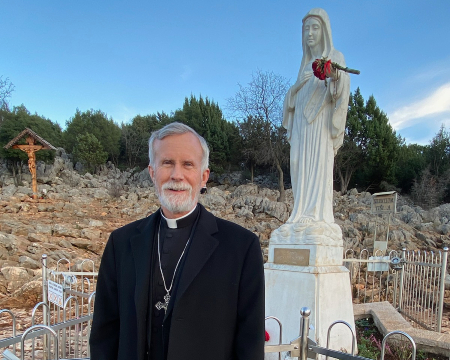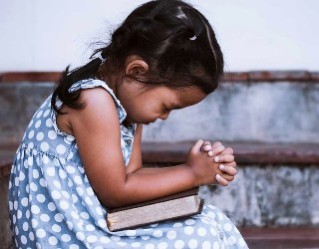We ask you, humbly: don't scroll away.
Hi readers, it seems you use Catholic Online a lot; that's great! It's a little awkward to ask, but we need your help. If you have already donated, we sincerely thank you. We're not salespeople, but we depend on donations averaging $14.76 and fewer than 1% of readers give. If you donate just $5.00, the price of your coffee, Catholic Online School could keep thriving. Thank you.Help Now >
Catholic Social Doctrine and Freedom for the Church
FREE Catholic Classes
The State must in particular respect the religious freedom of the Church, as a perfect society, one whose existence, constitution, and mission is by divine warrant. With respect to the Church, "[t]he duty to respect religious freedom requires that the political community guarantee the Church the space needed to carry out her mission." (Compendium, No. 424)
 Hi readers, it seems you use Catholic Online a lot; that's great! It's a little awkward to ask, but we need your help. If you have already donated, we sincerely thank you. We're not salespeople, but we depend on donations averaging $14.76 and fewer than 1% of readers give. If you donate just $5.00, the price of your coffee, Catholic Online School could keep thriving. Thank you. Help Now >
Hi readers, it seems you use Catholic Online a lot; that's great! It's a little awkward to ask, but we need your help. If you have already donated, we sincerely thank you. We're not salespeople, but we depend on donations averaging $14.76 and fewer than 1% of readers give. If you donate just $5.00, the price of your coffee, Catholic Online School could keep thriving. Thank you. Help Now >
Highlights
Catholic Online (https://www.catholic.org)
4/23/2012 (1 decade ago)
Published in U.S.
Keywords: Religious Freedom, religious liberty, inalienable rights, Catholic Social Teaching, Natural Law, Andrew M Greenwell,
CORPUS CHRISTI, TX (Catholic Online) - The issue of religious freedom is cleft into two. There is the religious freedom and freedom of conscience that is part and parcel of the natural man who seeks the truth, the homo quaerens Deum. We handled that issue in our last article. But there is also the religious freedom and freedom of conscience that arise out of Jesus Christ, the Deus quarens in homine hominem, the "God who seeks man in man" as St. Augustine put it.
How does Jesus Christ affect religious freedom?
The Catholic Church was founded by Jesus Christ, and so we have to focus on who this Jesus Christ was, and what authority in heaven and earth was given him in order to understand what authority was given to the Church by him. As the Declaration of the Congregation for the Doctrine of the Faith puts it in Dominus Iesus, "The Lord Jesus, before ascending into heaven, commanded his disciples to proclaim the Gospel to the whole world and to baptize all nations . . . . The Church's universal mission is born from the command of Jesus Christ and is fulfilled in . . . the mystery of the incarnation of the Son, as saving event for all humanity."
We have here two realities: Jesus and the Church. We shall briefly treat of who Jesus is, and then what the Church Jesus established is.
In Jesus we confront what the Protestant theologian Gerhard Kittel called "das Ärgernis der Einmaligkeit," which been translated as "the scandal of particularity." The "scandal of particularity" in Jesus arises from the fact that he is God as well as man. Among all religious figures he is unique and universal. This "scandal of particularity" has a great effect upon the Church's understanding of her freedom vis-ŕ-vis the various States.
Relying on the teachings of Dominus Iesus, we see in Jesus Christ, "the full revelation of divine truth is given." The Church is convinced that in Jesus "the deepest truth about God and the salvation of man shines forth," as he is "at the same time the mediator and the fullness of all revelation." Jesus is "the new and definitive covenant," one which "will never pass away," and one which expects "no further new public revelation before the glorious manifestation of our Lord Jesus Christ." God's revelation to man is fully completed in Christ. There is for man no other Savior. There is for man no other Way.
We ask you, humbly: don't scroll away.
Hi readers, it seems you use Catholic Online a lot; that's great! It's a little awkward to ask, but we need your help. If you have already donated, we sincerely thank you. We're not salespeople, but we depend on donations averaging $14.76 and fewer than 1% of readers give. If you donate just $5.00, the price of your coffee, Catholic Online School could keep thriving. Thank you.Help Now >
"There is only one salvific economy of the One and Triune God, realized in the mystery of the incarnation, death, and resurrection of the Son of God, actualized with the cooperation of the Holy Spirit, and extended in its salvific value to all humanity and to the entire universe: 'No one, therefore, can enter into communion with God except through Christ, by the working of the Holy Spirit.'"
This is the "scandal of particularity" in Jesus.
"The Lord Jesus, the only Savior," continues Dominus Iesus, " constituted the Church as a salvific mystery: he himself is in the Church and the Church is in him. Therefore, the fullness of Christ's salvific mystery belongs also to the Church, inseparably united to her Lord." In short, just as there is one mediator, there is one Church. "[T]herefore, there exists a single Church of Christ, which subsists in the Catholic Church, governed by the Successor of Peter and by the Bishops in communion with him."
This is the "scandal of particularity" as it pertains to Christ's body, the Church.
The Church was given a mission by the God who revealed himself in Christ. "With the coming of the Savior Jesus Christ, God has willed that the Church founded by him be the instrument for the salvation of all humanity." "The mission of the Church is 'to proclaim and establish among all peoples the kingdom of Christ and of God, and she is on earth, the seed and the beginning of that kingdom."
Uniquely, the Church has been divinely appointed to proclaim and to establish, to say and to do. With this duty come rights.
What rights, then do Jesus and his Church have against civil society, in particular against the political community which orders civil society? The answer to that question is briefly treated in sections 424-27 of the Compendium of the Social Doctrine of the Church.
Like the State, the Church manifests itself in a "visible organizational structure." It is, along with the State, a "perfect society" with all the means at its disposal for its function. (Compendium, No. 445) To be sure, the "organizational structures" of the Church and of the State "are by nature different because of their configuration and because of the ends they pursue." (Compendium, No. 424). Their respective ends principally determine their spheres of competence, although, since societies and the men which compose them are one and not divided, they may be some overlap.
"The Second Vatican Council," the Compendium states, "solemnly reaffirmed that, 'in their proper spheres, the political community and the Church are mutually independent and self-governing.'" In some respects, they are autonomous. "The autonomy and independence of these two realities is particularly evident with regards to their ends." (Compendium, No. 424)
As we discussed in our last article, the State must respect the religious freedom of its citizens since they are under a duty under the natural moral law which impels them to seek truth, to accept it once recognized, and to live their life in accordance with their well-formed conscience as they travel--in full light or in partial shade--to the one True God.
But the Church also has rights separate and apart from these. The State must in particular respect the religious freedom of the Church, as a perfect society, one whose existence, constitution, and mission is by divine warrant. With respect to the Church, "[t]he duty to respect religious freedom requires that the political community guarantee the Church the space needed to carry out her mission." (Compendium, No. 424)
Failure to do so is against the will of God.
We might therefore craft a sort of "Bill of Rights" of the Church as summarized by the Compendium:
- The right to the legal recognition of her proper identity
- The right to express her moral judgment on "all of human reality," to the extent that it may be needful to "defend the fundamental rights of the person or for the salvation of souls."
- The right to freedom of expression
- The right to teach and to evangelize
- The right to worship God in a public manner
- The right to her own organization, her own internal government, without interference from the State, including the right to select, educate, name, and transfer ministers
- The right to construct religious buildings
- The right to acquire and possess sufficient goods for her activity
- The right to form associations not only for religious purposes, but also for educational, cultural, health case, and charitable purposes
Communist governments (e.g., China) and Islamic governments (e.g., Saudi Arabia, Pakistan, Sudan, Afghanistan, Iran, etc.) grossly violate these rights, and so, in their laws which prevent the Church from exercising freely her mission, may be said to be acting manifestly against the will of God as revealed both in the natural moral law and in divine law as contained in the Gospels. Unfortunately, we increasingly see the same kind of violations in liberal or secularist governments of the West. Particularly offensive, however, are the actions of the Islamic countries which, ostensibly in name of God act against the will of God.
We must insist that the Church's rights be respected by all governments of the world. This is based upon a preeminent law: salus animarum suprema lex. The salvation of the souls is the supreme law. In the words of the crusaders: Deus lo vult, God wills it.
-----
Andrew M. Greenwell is an attorney licensed to practice law in Texas, practicing in Corpus Christi, Texas. He is married with three children. He maintains a blog entirely devoted to the natural law called Lex Christianorum. You can contact Andrew at agreenwell@harris-greenwell.com.
---
'Help Give every Student and Teacher FREE resources for a world-class Moral Catholic Education'
Copyright 2021 - Distributed by Catholic Online










 Daily Readings for Saturday, April 20, 2024
Daily Readings for Saturday, April 20, 2024 St. Marian: Saint of the Day for Saturday, April 20, 2024
St. Marian: Saint of the Day for Saturday, April 20, 2024 Children's Prayer For Parents: Prayer of the Day for Saturday, April 20, 2024
Children's Prayer For Parents: Prayer of the Day for Saturday, April 20, 2024

